Is Croatia Next After Poland?
Adelina Marini, March 14, 2016
The idea behind the young tradition of the euinside weekly reviews is to focus on the most important events in the EU and then cast a glance at the periphery as well. For the week of March 7-13 we will change the direction and will start with Croatia, because developments there are the next episode of the Orbánisation of South-East Europe, should we presume that Orbánism is a form of authoritarianism, which is feeling comfortable in the European legal environment. Otherwise, the most important accent this week in the EU is the draft deal with Turkey, which caused sharp reactions, mainly because of the repressive media policy of Turkish officials.
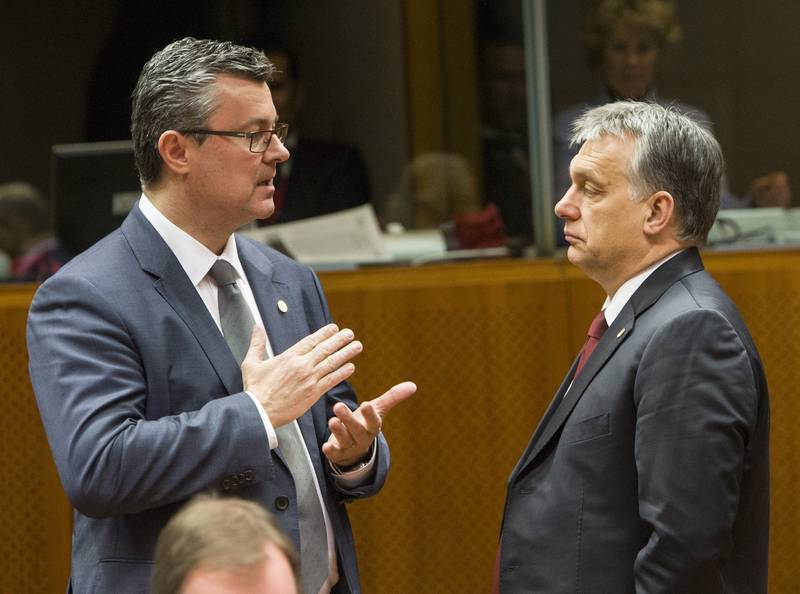
Several troubling events happened on the media scene in Croatia. We will list them by importance, not chronologically. After the dismissal during the week of February 29 - March 6 of the Director General of the Croatian Television and Radio (HRT) Goran Radman, in the past week the controversial Culture Minister Zlatko Hasanbegović aimed at the president of the Council for Electronic Media (CEM) Mirjana Rakić as well. The Council’s report for 2014 was dismissed at the government meeting and a change of its staff was demanded. Mirjana Rakić recently shut down for several days the Z1 TV channel because of hate speech in the broadcast of a famous journalist of that media.
This caused the second in a row of reactions from the Organisation for Security and Co-operation in Europe (OSCE). According to the organisation’s representative for freedom of media Dunja Mijatović, “these decisions of the authorities give ground for serious concerns about the condition of media freedom in the country”. She appealed to Croatian authorities to take urgent steps to stop this tendency and do whatever is necessary to protect the independence of public television and the regulatory body. Further to being the step towards the changing of the leadership of the Croatian CEM, the change in management of the HRT is already bearing fruit. Almost all news anchors of the television were replaced on Saturday.
In the very beginning of last week, the famous political reporter of the Croatian Nova television Tatjana Krajač wrote a sharp commentary [in Croatian] on the television’s webpage, in which she criticises the attempts of the Croatian Parliament to limit the work of journalists. “New rulers, new rules!” she wrote in relation to the authorities’ attempts to ban the photographing of ministers at the entrance of the government building. “All of these ambushes in front of the government building would disappear when ministers begin answering journalists’ questions, but they do not do that”, complained Tatjana Krajač. She further claims that there are limitations of access to MPs in the Parliament building as well. The journalist gives the European Parliament in Strasbourg as an example to follow. “I have been to the Parliaments of several European states, in the EP in Strasbourg I already feel at home and rules there are known and journalists are not restricted”.
Setting the EP as an example may be a strong message for MEPs to pay more attention to the media situation in member states where it is threatened and continue being an example to follow. Somewhat as an addition to this subject was the latest statement of Croatian Foreign Minister Miro Kovač that the country wants stronger cooperation with the states of the Visegrad group.
2:2
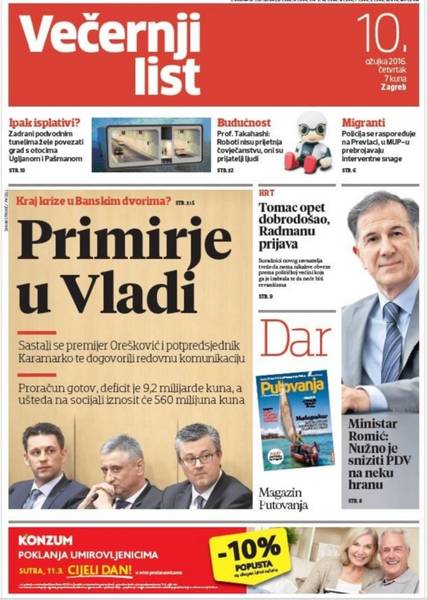
The battle in Croatia on who is the real prime minister has continued over the past week as well. Unfortunately, this shows that the EC’s decision to change the approach towards accession for the first time with the newest member was not sufficient to establish irreversible democracy and institutional stability. Parties continue to dominate over institutions. This sounds even more frightening against the background of the declarations from members of the new government for closer cooperation with the Visegrad four, where illiberalism has turned into an alternative.
Intra-coalition struggles last week brought a win and a loss. The liberal and reformist forces around Prime Minister Tihomir Orešković lost on the media front, but won (for now) on the front of army veterans. The man proposed by the senior coalition partner – the Patriotic coalition – to serve as new army veteran minister, Milijan Brkić, ended up having his nomination withdrawn, after the PM’s appeal to veteran associations to raise their own nominations produced about a dozen candidates.
Brkić's withdrawal is a heavy blow to the Patriotic coalition and the Croatian Democratic Union (HDZ) in particular, whose leader Tomislav Karamarko is facing party elections soon. It becomes clear from Brkić’s Facebook posting that the lessons from the silent war for his nomination have not been learned. He did not get a silent dismissal from the PM because he has no qualities to be a minister of veterans, but because he plagiarised over 70% of his doctor’s dissertation, regardless of court not taking away his degree.
At the moment, the score in the game between the forces of the past and those of the future is 2:2. Orešković and company have lost the media and acquiesced to the remaining of the minister of culture. They did, however, prevail in the dismissal of the previous veterans minister, Mijo Crnoja, and the withdrawal of Brkić’s nomination. For over a month the question of the dismissal request for the boss of the intelligence agency, Dragan Lozančić, remains open, regardless of it requiring just two signatures – of the President and the Prime Minister. PM Orešković for yet another week fought off the attacks for taking too long to decide whether he will yield to pressure from President Kolinda Grabar-Kitarović to replace Lozančić.
Meanwhile, right after the presentation of this year’s budget draft, Moody’s credit rating agency lowered the already junk foreign currency rating of Croatia to a level of Ba2. The reason is the high public debt and the low economic growth prospects in the medium term. Whether this will force the warring coalition partners to finally make peace and tackle the real problems, instead of dealing with personnel issues, is yet to be seen this week. The situation keeps raising the question of is it possible for this government to survive and what will be the price for it.
How much does media (non)freedom cost?
The Turkish one costs six billion euro. The rights of refugees are thrown in as a bonus to the price. This became clear from the draft deal with Turkey, negotiated over the emergency and arduous EU-Turkey summit last Monday (March 7). The deal caused sharp reactions, especially in the European Parliament. Member states were accused of selling the European values only to get rid of the unpleasant refugees, whose problems are changing the political landscape of the Union at an alarming speed. You can read details about the deal in euinside’s analysis here.
Serbia is drowning in neutrality
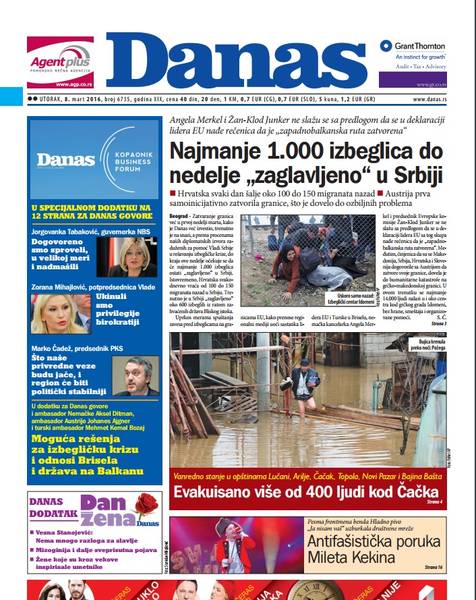 There were two leading subjects in Serbia over the last week – the floods and the visit of President Tomislav Nikolić to Russia. The government of PM Aleksandar Vučić declared a state of emergency in the middle of the election campaign. The curious thing was that the floods in many parts of the country were not the main reason behind this decision. Refugees were the main motive. Serbia is the second state to do this after Hungary, which declared a state of emergency last week because of refugees, fearing that the refugees who have fallen behind in countries along the Balkan route may cause trouble. Serbia prepared its army to lend aid along the southern borders of the country. The possibility for army participation in border patrolling was opened in Croatia as well.
There were two leading subjects in Serbia over the last week – the floods and the visit of President Tomislav Nikolić to Russia. The government of PM Aleksandar Vučić declared a state of emergency in the middle of the election campaign. The curious thing was that the floods in many parts of the country were not the main reason behind this decision. Refugees were the main motive. Serbia is the second state to do this after Hungary, which declared a state of emergency last week because of refugees, fearing that the refugees who have fallen behind in countries along the Balkan route may cause trouble. Serbia prepared its army to lend aid along the southern borders of the country. The possibility for army participation in border patrolling was opened in Croatia as well.
While PM Vučić toured flooded municipalities, President Nikolić toured Moscow, where he attempted to calm down the Russians that a full blown referendum for NATO membership is unnecessary, because Serbia remains military neutral. In an interview for Sputnik Nikolić stated that it was sufficient to tell the Russians that Serbia will not join NATO. He sent out another important message from Moscow – Serbia will cooperate both with the EU and Russia as long as it is wanted. If someone is setting conditions, he said, “it means they do not want us”. Serbia will never recognise Kosovo, even if it means that it will never join the EU, further said Tomislav Nikolić.
The media environment in Serbia was also a subject over the past week. PM Vučić gave an important interview only on this subject for the famous documentary-investigative TV show Insajder. The interview has English subtitles as well. In it, he admitted that he shouldn’t have used such strong language regarding the Balkan Investigative Reporting Network BIRN on the scandal about a large public tender, as euinside reported back then. He also committed to analysing his attitude toward the media, especially the ones receiving donations from foreign donors.
After-party Bulgaria continues to chase its own tail
The week in Bulgaria passed under the sign of the next in a series of changes to the election code. I do not think I will exaggerate if I said this is the most repaired law in the country. There are amendments made to it annually. The changes voted last week institute mandatory voting and only a partial possibility for online voting. The consecutive attempts at changing election legislation were met with a cold shower by two polls, published in the week of March 7-13. The poll of Alfa Research notes growth in corruption, lack of justice, and dissatisfaction with government. 58.6% of responding Bulgarian citizens share this feeling versus 22.3%, who share the government’s optimism, wrote [in Bulgarian] The Sega newspaper.
Trust in PM Boyko Borissov has dropped from 38% to 33%. 71% of Bulgarian citizens feel that political and economic stability is impossible without deep reforms. Exacta’s poll shows that 60% of Bulgarians disapprove of the government’s work. This did not hinder MEPs from three political powers – GERB (EPP), DPS (ALDE), and BSP (Socialists and Democrats) in demanding the lifting of the Cooperation and Verification Mechanism, which is used to monitor Bulgaria’s progress in the fight against corruption and organised crime, and the providing of an independent judiciary. According to The Sega newspaper [in Bulgarian] they will request the mechanism's dismissal during the discussion on this year’s report of the EC on Bulgaria during the meeting of the Committee on Civil Liberties, Justice and Home Affairs on March 16.
Initiators are Emil Radev and Maria Gabriel from GERB, Filiz Hyusmenova from DPS, and Iliana Iotova from BSP. Several weeks ago, Commission President Jean-Claude Juncker hinted that Bulgaria and Romania might get separated and Romania, provided it continues the same way, could exit the mechanism before Bulgaria. This caused violent reactions in Bulgaria, as euinside reported.
The coming week in the EU will again go under the sign of yet another summit dedicated to migration.
Translated by Stanimir Stoev
 Kolinda Grabar-Kitarovic | © KGK
Kolinda Grabar-Kitarovic | © KGK Jozo Rados | © European Parliament
Jozo Rados | © European Parliament Aleksandar Vucic, Andrej Plenkovic | © Vlada RH
Aleksandar Vucic, Andrej Plenkovic | © Vlada RH Bakir Izetbegovic, Andrej Plenkovic | © Council of the EU
Bakir Izetbegovic, Andrej Plenkovic | © Council of the EU Aleksandar Vucic, Recep Tayyip Erdogan | © Serbian Presidency
Aleksandar Vucic, Recep Tayyip Erdogan | © Serbian Presidency Jean-Claude Juncker, Zoran Zaev | © European Commission
Jean-Claude Juncker, Zoran Zaev | © European Commission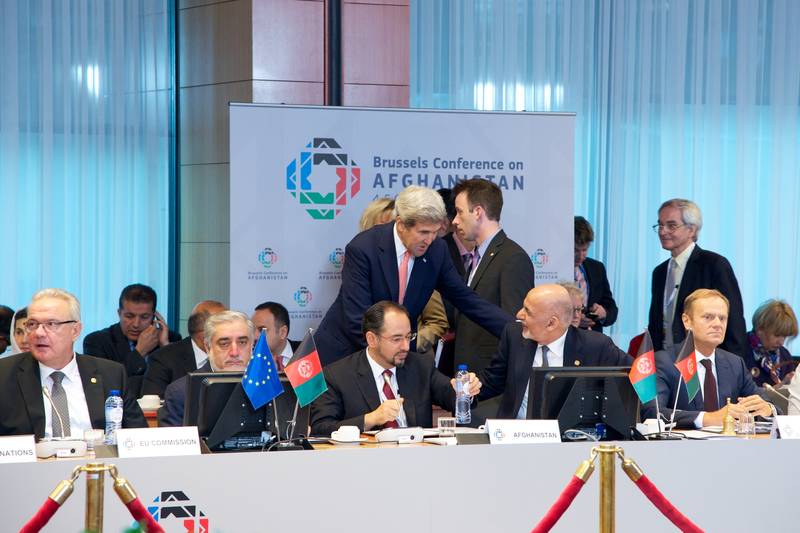 | © Council of the EU
| © Council of the EU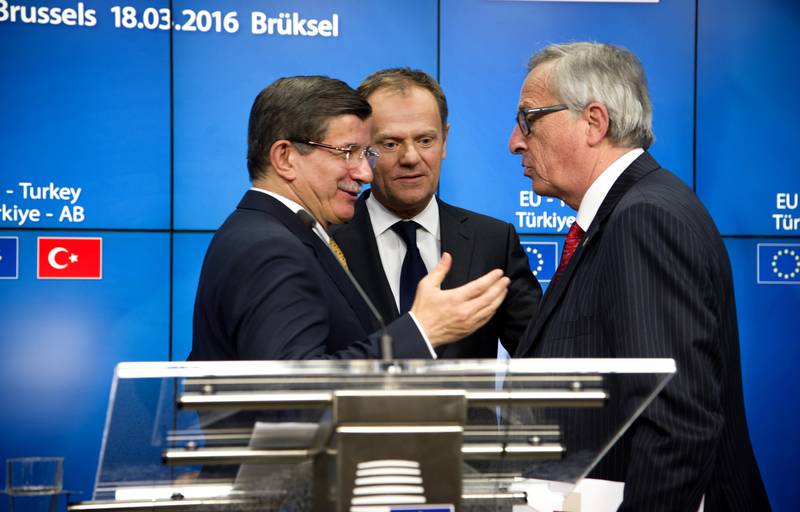 Davutoglu, Tusk, Juncker | © Council of the EU
Davutoglu, Tusk, Juncker | © Council of the EU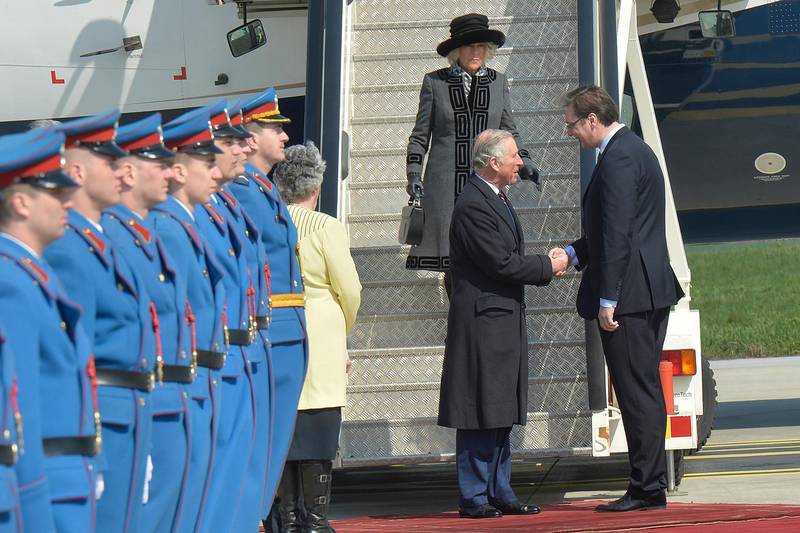 | © Vlada RS
| © Vlada RS